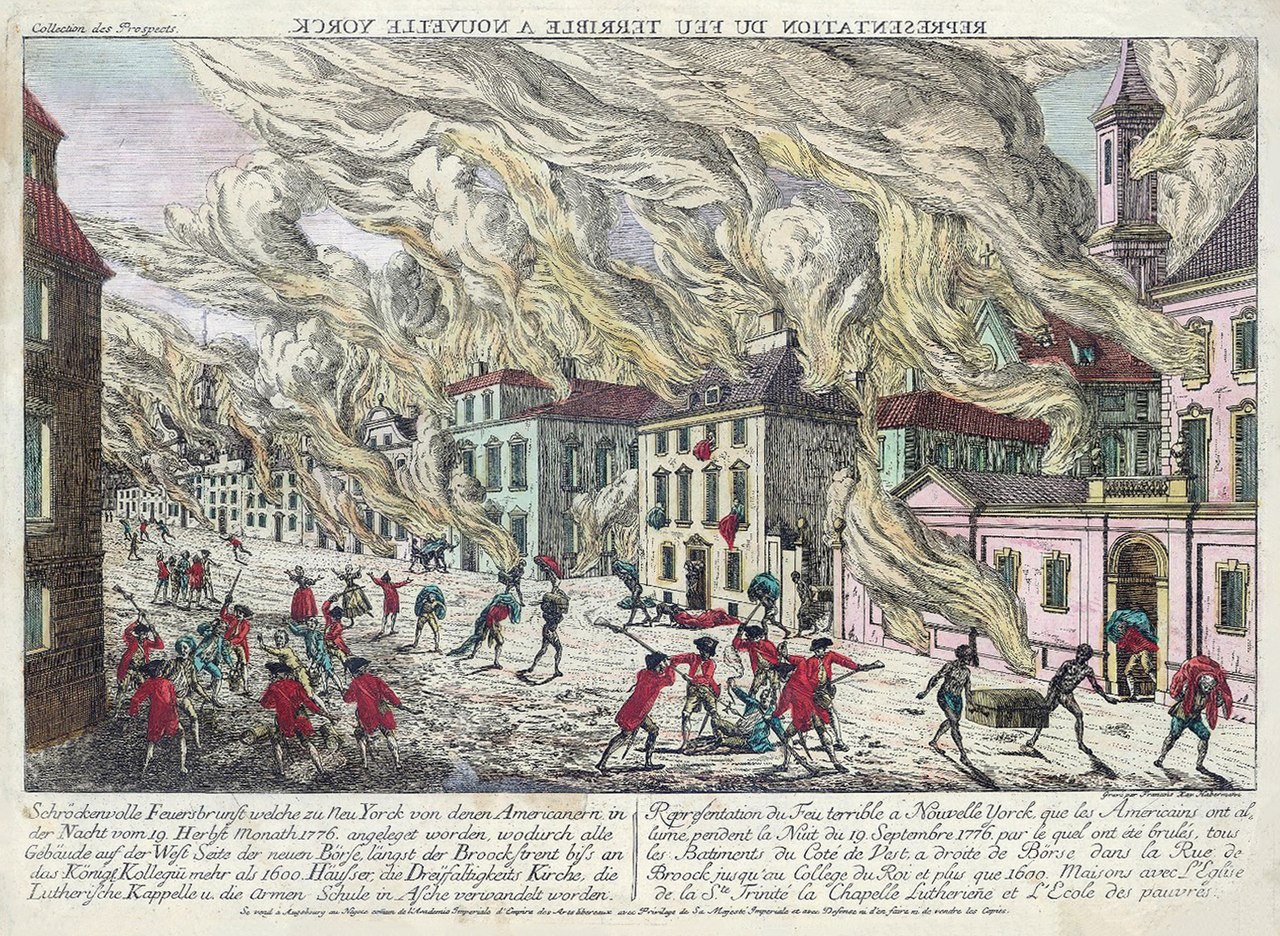84 Abandonment of New York (1776)

King’s Bridge, September 18, 1776.
About the middle of last week it was determined for many reasons, to evacuate the City of New York. And accordingly orders were given for removing the ordnance, military, and other stores from thence; which by Sunday morning was nearly effected. On Saturday four of the enemy’s large ships passed by the city up the North River and anchored near Grenage [Greenwich Village] and about as many up the East River, which anchored in Turtle Bay. And from the movements of the enemy on Long Island and the small islands in the East River, we had great reason to apprehend they intended to make a landing and attack our lines somewhere near the city. Our army for some days had been moving upwards this way and encamping on the heights, southwest of Colonel Morris’s where we intended to form lines and make our grand stand. On Sunday morning the enemy landed a very considerable body of troops, principally consisting of their Light Infantry and Grenadiers, near Turtle Bay under cover of a very heavy cannonade from their shipping. Our lines were but thinly manned, as they were then intended only to secure a retreat to the rear of our array. And unfortunately by such troops as were so little disposed to stand in the way of grape-shot that the main body of them almost instantly retreated. Nay fled, without a possibility of rallying them, though General Washington himself (who rode to the spot on hearing the cannonade) with some other General Officers exerted themselves to effect it.
The enemy on landing immediately formed a line across the island. Most of our people were luckily north of it and joined the army. The few that were in the city crossed the river, chiefly to Paulus-Hook, so that our loss in men, artillery, or stores, is very inconsiderable. I don’t believe it exceeds one hundred men and I fancy most of them from their conduct stayed out of choice. Before evening the enemy landed the main body of their army, took possession of the city, and marched up the island, and encamped on the heights extending from McGown’s and the Black-Horse to the North River.
On Monday morning about ten o’clock a party of the enemy consisting of Highlanders, Hessians, the Light Infantry, Grenadiers, and English troops (number uncertain) attacked our advanced party, commanded by Colonel Knowlton, at Martje Davit’s Fly. They were opposed with spirit and soon made to retreat to a clear field southwest of that about two hundred paces, where they lodged themselves behind a fence covered with bushes. Our people attacked them in front and caused them to retreat a second time, leaving five dead on the spot. We pursued them to a buckwheat field on the top of a high hill, distant about four hundred paces, where they received a considerable reinforcement with several field-pieces and there made a stand. A very brisk action ensued at this place, which continued about two hours. Our people at length worsted them a third time. Caused them to fall back into an orchard, from thence across a hollow and up another hill not far distant from their own lines. A large column of the enemy’s army being at this time discovered to be in motion and the ground we then occupied being rather disadvantageous. A retreat likewise, without bringing on a general action (which we did not think prudent to risk) rather insecure, our party was therefore ordered in and the enemy was well contented to hold the last ground we drove them to.
We lost on this occasion Colonel Knowlton, a brave officer, and sixteen privates killed. Major Leitch from Virginia and about eight or ten subaltern officers and privates wounded. The loss of the enemy is uncertain. They carried their dead and wounded off, in and soon after the action. But we have good evidence of their having upwards of sixty killed and violent presumption of one hundred. The action, in the whole, lasted about four hours.
I consider our success in this small affair at this time almost equal to a victory. It has animated our troops, gave them new spirits, and erased every bad impression the retreat from Long Island had left on their minds. They find they are able with inferior numbers to drive their enemy, and think of nothing now but conquest. Since the above affair, nothing material has happened. The enemy keep close to their lines. Our advance parties continue at their former station. We are daily throwing up works to prevent the enemy’s advancing. Great attention is paid to Fort Washington, the posts opposite to it on the Jersey shore, and the obstructions in the river which I have reason to believe are already effectual so as to prevent their shipping passing. However it is intended still to add to them, as it is of the utmost consequence to keep the enemy below us.
Source: “Abandonment of New York” (1776), by George Clinton, in Peter Force, American Archives, Fifth Series (Washington, 1851), II, 383-384. https://archive.org/details/in.ernet.dli.2015.45494/page/n577/mode/2up
